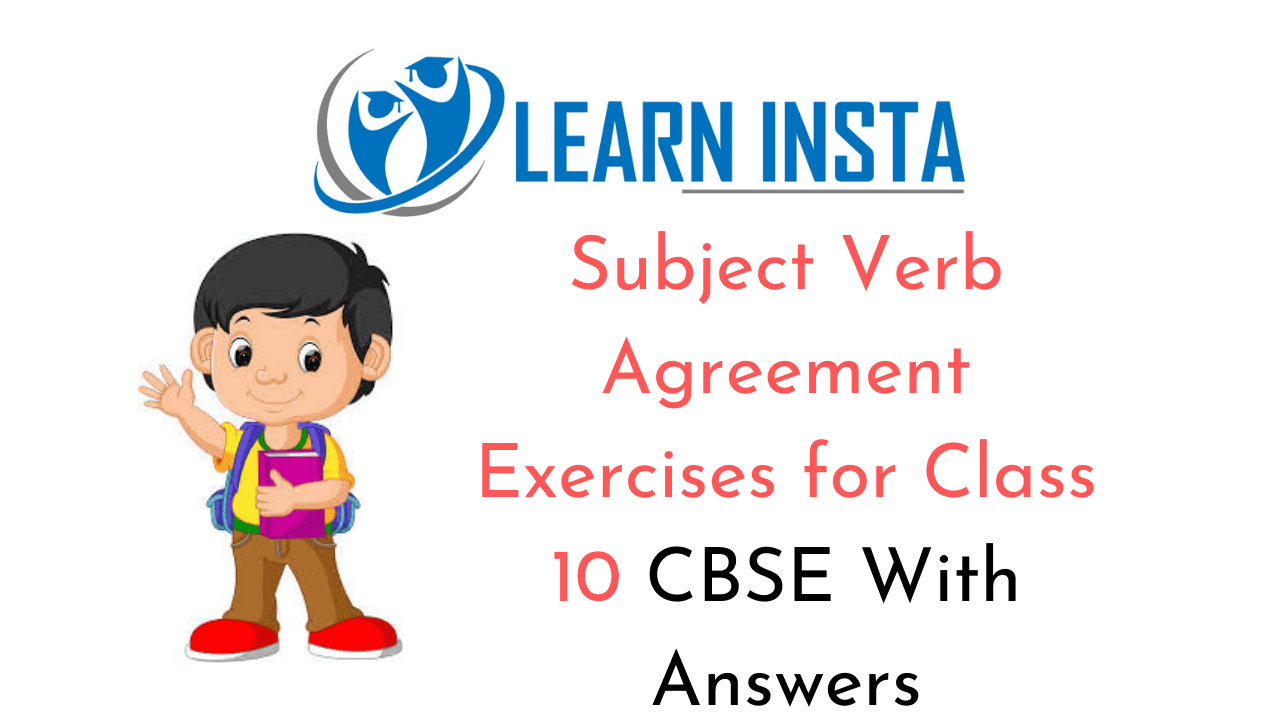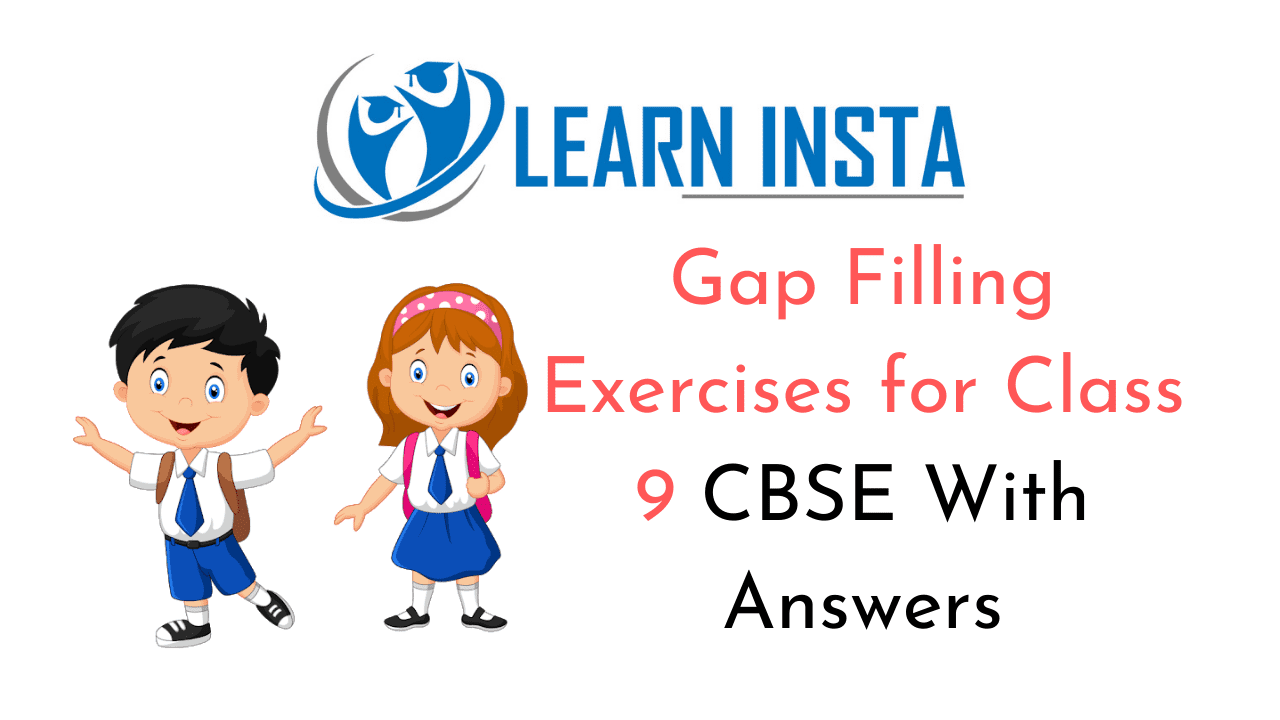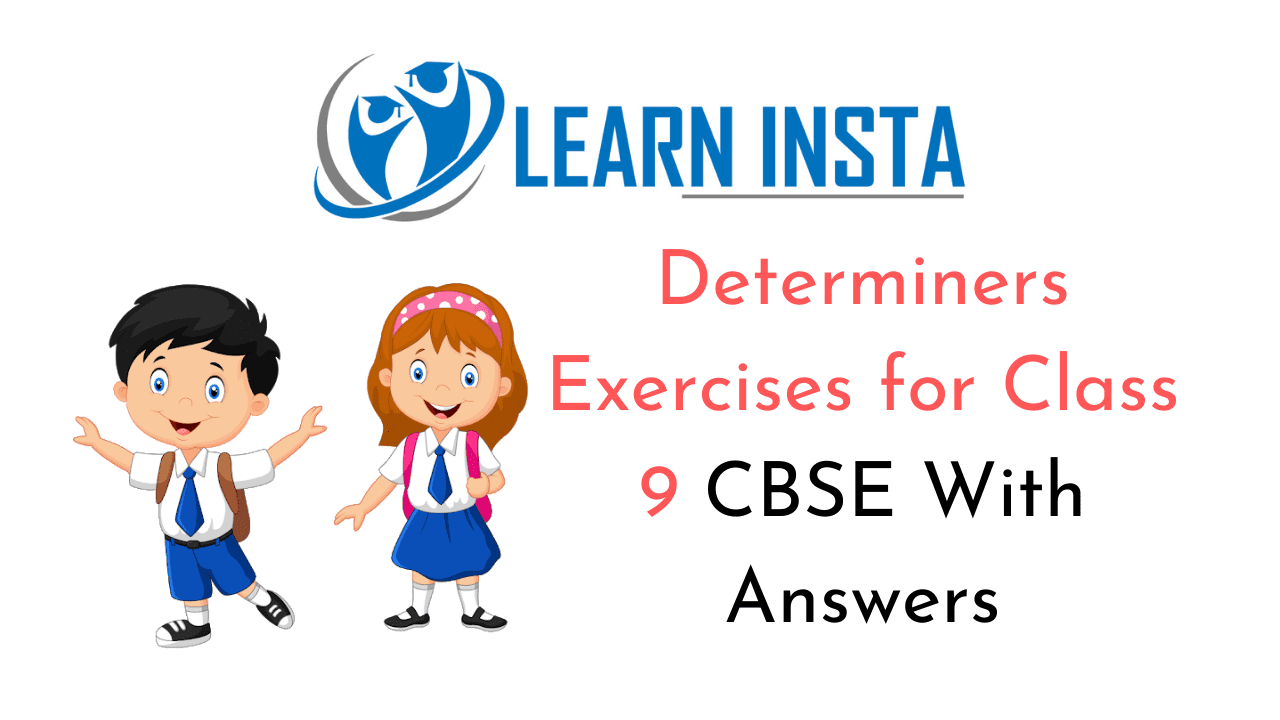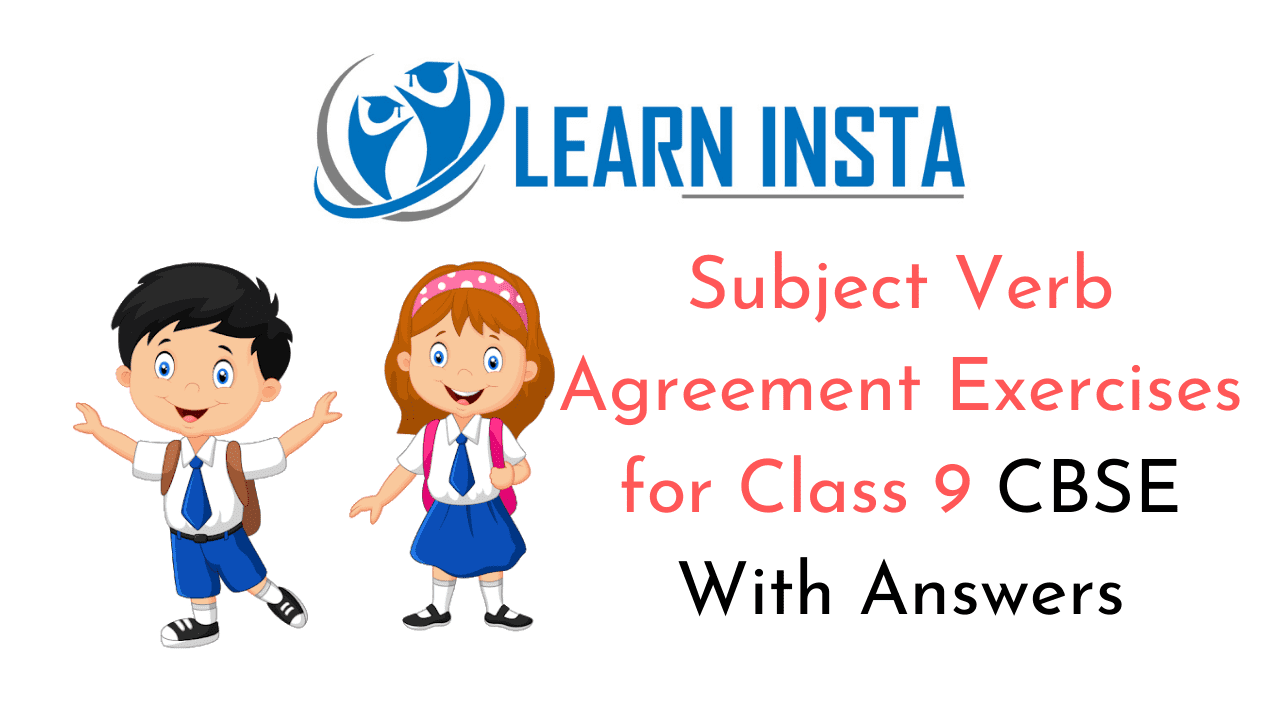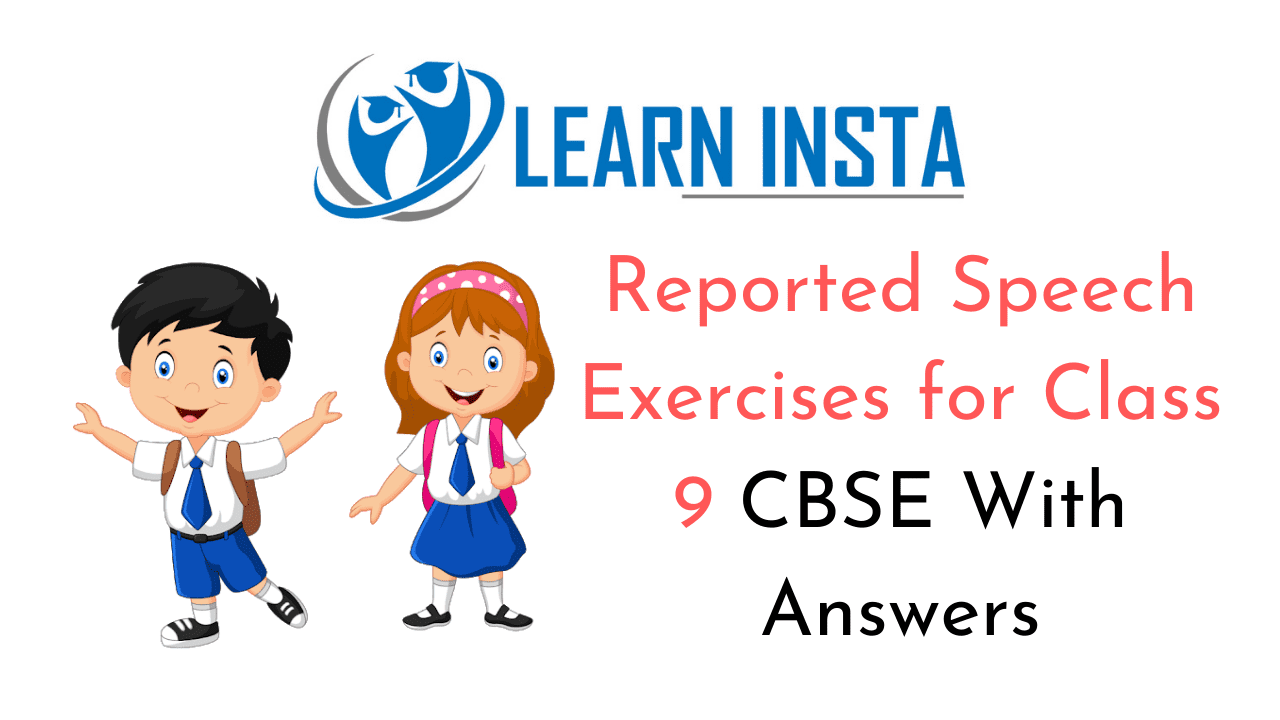
Reporting the words of the speaker in your own words is called reported speech.

This grammar section explains English Grammar in a clear and simple way. There are example sentences to show how the language is used. You can also visit the most accurate and elaborate NCERT Solutions for Class 9 English. Every question of the textbook has been answered here.
Reported Speech Exercises for Class 9 CBSE With Answers Pdf
Type 1. Statements
Steps to be kept in mind for changing direct speech into indirect (statements).
Step 1. The reporting verb is changed as under.
(a) We ‘say’ something but we ‘tell’ somebody. Says to …………………………… tells.
(b) Says …………………………… says.
(c) Said to …………………………… told/asserted/stated/informed.
(d) Said …………………………… said.
Step 2. Inverted commas are dropped and the conjunction ‘that’ is used.
Step 3. Change of personal pronouns and possessives.
Changing I, my, me, mine; we, our, us, ours (First-person).
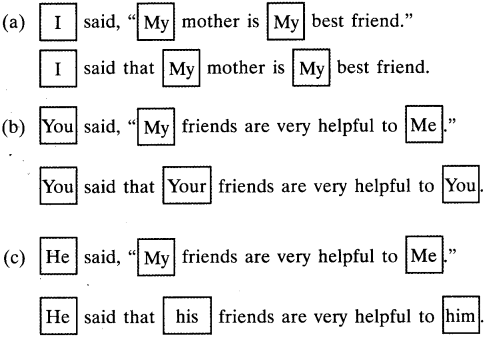
Note. These words refer to the speaker. So they change according to who the speaker is.
Step 4. If the reporting verb is in the present or future tense, the tense of the reported speech does not change.
Meera says to Mini, “Your teacher has praised you.” Meera tells mini that her teacher has praised her.
If the reporting verb is in the past tense, the tense of the reported speech gets changed into the corresponding past tense as under.
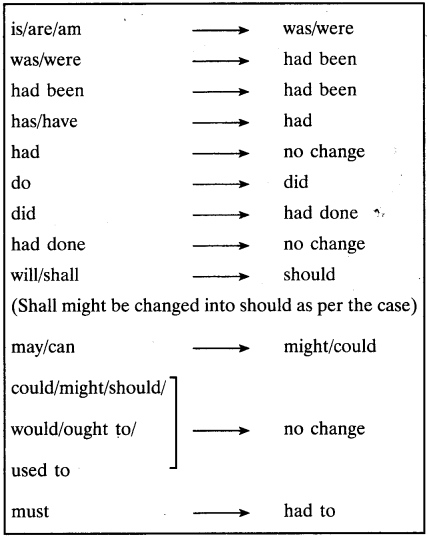
Step 5. Words denoting nearness of time and place are generally changed into words denoting distance.
| Direct speech | → | Indirect speech |
| Now | → | then |
| This | → | that |
| These | → | those |
| Here | → | those |
| jo | → | before |
| Yesterday | → | the previous day |
| Tomorrow | → | the next day, the following day |
| Today | → | that day |
| Tonight | → | that night |
Note. There are two situations where even if the reporting verb is in the past tense, the verb of the reported speech remains unchanged.
1. If the reported speech expresses a universal truth or a habitual fact.
- The teacher said, “Two and two make four.”
The teacher said that two and two make four. - Ramesh said to the tourist, “Summers in India are usually very hot.”
Ramesh informed the tourist that summers in India are usually very hot.
2. The reported speech describes a situation which still exists when the speech is reported.
- The stationmaster said, “Due to heavy rains, the trains are running late”.
- The stationmaster said that due to heavy rains, the trains are running late.
Type 2. Questions
A. If the reported speech is a question, the following changes are made.
The reporting verb is changed into ‘asked/required’.
| Says | asks A |
| Says to | asks |
| Said | asked |
| Said to | asked |
B. The inverted commas are removed and If/whether is used. The question mark is removed and a full stop is placed. No conjunction is used while reporting wh-questions. The direct form is changed to indirect question form. Place the subject before verb in the reported question.
- I said to Meera, “When are your parents coming?”
I asked Meera when her parents were coming. - Ramesh said to me, “Are you reading this book?”
Ramesh asked me if/whether I was reading that book. - He said, “Will you come with me?”
He asked if/whether I would go with him.
Type 3. Commands and Requests
If reporting commands and requests, the indirect speech is introduced by some verbs expressing commands or requests and the imperative mood is changed into the infinitive.
Step 1. The reporting say (said) is changed to order(ed)/request(ed)/advise(d)/command(ed)/ encourage(ed) /shout(ed)/forbid (forbade), proposed, etc.
Step 2. The verb of the reported speech is changed into an infinitive and inverted commas are removed.
Step 3. Do not is changed to ‘not to’.
- He said to his sister, “Please speak slowly.”
He requested his sister to speak slowly. - The teacher said, “Keep quiet.”
The teacher ordered to keep quiet. - He said to me, “Don’t tease the animal.”
He advised me not to tease the animal. - She said to me, “Let us go for a picnic”.
She proposed (or suggested) to me that we should go for a picnic.
Type 4. Exclamations and wishes
Step 1. The reporting verb said is changed to exclaimed, wished, prayed, etc.
Step 2. The exclamatory form is changed into the statement form and the mark of exclamation is replaced by a full stop.
Step 3. The reporting verb is joined with reported speech with ‘that’.
Step 4. All interjections are omitted and suitable adverbs or other expressive words are used.
| What! Oh! | surprised |
| Alas! Ah! | sadness, grief, pity |
| Hurrah! | joy, happiness |
| Bravo! | approval, cheered |
- They said, “Hurrah! We have won the match.”
They exclaimed with joy that they had won the match. - She said, “Alas! He is no more.” A
She exclaimed with sorrow that he was no more. - He said, “Good-bye friends.”
He bade good-bye to his friends.
Reported Speech Solved Examples Exercises for Class 9 CBSE
Change the following from direct to indirect speech.
Type 1
Question 1.
The doctor said to me, “The climate of this city won’t suit you.”
Answer:
The doctor told me that the climate of that city wouldn’t suit me.
Question 2.
Priya says, “The Earth is round.”
Answer:
Priya says that the Earth is round.
Question 3.
My brother said to his friend, “I am very sleepy.”
Answer:
My brother told his friend that he was very sleepy.
Question 4.
She said, “I have passed the exams.” ‘
Answer:
She said that she had passed the exams.
Type 2
Question 5.
My friend said, “Have you ever been to London?”
Answer:
My friend asked me if I had ever been to London.
Question 6.
The policeman said to us, “Where are you going?”
Answer:
The policeman enquired where we were going.
Question 7.
My friend said to me, “Can you solve the problem?”
Answer:
My friend asked me if/whether I could solve the problem.
Question 8.
My mother said to the stranger, “What is the purpose of your coming?”
Answer:
My mother asked the stranger what was the purpose of his coming.
Type 3
Question 9.
The teacher said to the students, “Complete your work.” [
Answer:
The teacher ordered the students to complete their work. ,
Question 10.
The Principal said to the parents, “Please sit inside the hall.” |
Answer:
The Principal requested the parents to sit inside the hall. j
Question 11.
Sunil said to his friend, “Don’t forget to recharge your mobile.” i
Answer:
Sunil reminded his friend not to forget to recharge his mobile.
Question 12.
My sister said to me, “Consult a doctor regarding your eyesight.”
Answer:
My sister advised me to consult a doctor regarding my eyesight. |
Type 4
Question 13.
She said, “May God bless her with a child!”
Answer:
She said that God might bless her with a child!
Question 14.
He said, “What a terrible night it is!”
Answer:
He exclaimed that it was a terrible night.
Question 15.
He said, “Alas! I perish by the people I made.
Answer:
He confessed with regret that he was perished by the people he had made.
Question 16.
He said, “Alas! what a fool I am.
Answer:
He exclaimed with grief/regret that he was a great fool.
Change the narration of the following sentences from direct to indirect.
Question 17.
The saint said, “Go to the Himalayas for meditation.”
Answer:
The saint ordered to go to the Himalayas for meditation.
Question 18.
Sita said to Praveen, “I will return your money tomorrow.”
Answer:
Sita told Praveen that she would return his money the next day.
Question 19.
The news said, “A strong earthquake has hit Japan.”
Answer:
The news said that a strong earthquake has hit Japan. . ”
Question 20.
My uncle said to Sheela, “I have a surprise for you.”
Answer:
My uncle told Sheela that he had a surprise for her.
Question 21.
She said, “Do you want to stay abroad?”
Answer:
She asked if he wanted to stay abroad.
Question 22.
The Met Department announced, “It may rain tomorrow.”
Answer:
The Met. Department announced that it might rain the next day.
Question 23.
I/He said, “How I wish they would come”.
Answer:
He exclaimed that he wished they would come.
Question 24.
Ashu said to his friend, “Are you willing to share your books with me?”
Answer:
Ashu asked his friend if he was willing to share his books with him.
Question 25.
The Major said to the jawans, “Start marching left.”
Answer:
The major ordered the Jawans to start marching left.
Question 26.
Sheetal said to her mother, “Have you ever thought about yourself in life?”
Answer:
Sheetal asked her mother if she had ever thought about herself in life.
Read the following dialogues and report in indirect narration.
Question 27.
Mother : Where were you?
Daughter ‘ : I was on the terrace playing.
Mother : Please do not go without prior permission.
Daughter : This was the first time ever that I went on the terrace.
Mother : Remember, do not go there alone.
Answer:
Mother asked her daughter where she had been. The daughter replied that she had been on the terrace playing. The mother then requested her not to go without prior permission. The daughter apologised saying that that had been the first time ever that she had gone on the terrace. The mother warned her saying not to go there alone.
Question 28.
Master : How are you feeling now?
Worker : I am feeling batter but I am not completely fine.
Master : Do you need more rest?
Worker : It is okey. I will report tomorrow.
Answer:
Master asked his worker how was he feeling then. The worker replied that he was feeling better but was not completely fine. The master further asked him if he needed more rest. The worker replied that that was okey and that he would report the next day.
Question 29.
Rajesh : Where are you going, Rohan?
Rohan : I am going to the temple to offer flowers.
Rajesh : Do you worship everyday and go to the temple?
Rohan : Yes, I go to the temple everyday to worship Lord Shiva.
Answer:
Rajesh asked Rohan where was he going. Rohan replied that he was going to the temple to offer flowers. Rajesh then asked him if he worshipped every day and went to the temple. Rohan replied in the affirmative and said that he went to the temple every day to worship Lord Shivai
Question 30.
Teacher : I want all students to quietly do the work.
Students : Will you allow us to go for games after this?
Teacher : First, all of you have to finish your work.
Students : We promise that we will finish our work first.
Answer:
Teacher instructed the students that she wanted them to quietly do the work. The students asked if she would allow them to go for games after that. The teacher insisted that first, all of them had to finish their work. The students then promised her that they would finish their work first.
Question 31.
Father : Why did you go to the market today?
Son : I had to buy some material to do my project.
Father : Who gave you the project?
Son : My science teacher gave the project.
Father : Do you need any money for it?
Ans.
Father asked his son why had he gone to the market that day. Son replied that he had to buy some material to do his project. Father then asked him who had given the project. Son replied that his science teacher had given the project. Father then asked his son if he needed any money for that.
Question 32.
Customer : You have a variety of frozen stuff.
Shopkeeper : You can buy as much as you like.
Customer : Why don’t you keep fresh vegetables?
Shopkeeper : Things have become very expensive these days.
Customer : You should start keeping good stuff otherwise I shall stop buying from you.
Answer:
Customer told the shopkeeper that he had a variety of frozen stuff. Shopkeeper replied that he could buy as much as he liked. The customer then asked the shopkeeper why he didn’t keep fresh vegetables. The shopkeeper replied that things had become very expensive those days. The customer warned him that he should start keeping good stuff otherwise, he (customer) would stop buying from him.
Question 33.
Doctor : What did you eat yesterday?
Patient : I could hardly eat anything as I was having stomachache.
Doctor : Are you still having it?
Patient : At this moment, I am having fever and feeling weak.
Doctor : You most take rest.
Answer:
Doctor asked the patient what had he eaten the previous day. The patient repled that he could hardly eat anything as he had been having stomachache. Doctor then asked him if he was still having that. The patient replied that at that moment, he was having fever and was feeling weak. The doctor advised him to take rest.
Question 34.
Employee : Please grant me two weeks’ leave.
Boss : Why do you need it for such a long time?
Employee : I have to visit my ailing mother.
Boss : Okey, I shall grant you leave but do not overstay your leave.
Answer:
The employee requested his boss to grant him two weeks’ leave. The boss asked him why he needed leave for such a long time. The employee replied that he had to visit his ailing mother. The boss agreed to grant him leave but instructed him not to overstay his leave.
Question 35.
Kanika : Have you seen the animation film released recently?
Keshav : I am not allowed to watch films.
Kanika : How is this possible in present times?
Keshav : My parents are very strict.
Answer:
Kanika asked Keshav if he had seen the animation film released recently. Keshav replied that he was not allowed to watch films. Kanika further asked how that was possible in present times. Keshav informed that his parents were/are very strict.
Question 36.
Hameed : Did you visit the national museum?
Shano : How can I as there is nobody to accompany me?
Hameed : Do not worry.
Shano : I am not worrying but I am the only one who has not seen it.
Answer:
Hameed asked Shano if she had visited the national museum. Shano replied how she could as there was nobody to accompany her. Hameed told her not to worry. Shano replied taht she was not worrying but she was the only one who had not seen that.
Read the following dialogues and complete the report appropriately.
Question 37.
Preeti : Where did you spend your holidays?
Naman : I went to many hills stations. ‘
Preeti : Which one did you like the most?
Naman : Honestly speaking. I liked all as I am very fond of hills.
Preeti asked Naman (a) ………………………….. his holidays. Naman replied, (b) ………………………….. to many hill stations. Preeti then asked him (c) the most. Naman said that honestly speaking (d) ………………………….. of hills.
Answer:
(a) where he had spent his holidays.
(b) that he had gone to many hill stations.
(c) which one he had liked. „
(d) he liked all as he was very fond.
Question 38.
Archna : Do you know swimming?
Rudra : Yes, I do.
Archna : Can you teacher me how to swim?
Rudra : Yes, I will. Come to my swimming club tomorrow.
Archna asked Rudra (a) ………………………….. swimming. Rudra replied in the affirmative. Then, Archna further asked him (b) ………………………….. how to swim. Rudra replied that he (c) ………………………….. he also asked Archna (d) ………………………….. club (e) …………………………. .
Answer:
(a) if he knew
(b) if he could teach her
(c) would
(d) to go to his swimming
(e) the next day.
Question 39.
Father : How was the paper?
Son : It was easy. I could solve all the problems.
Father : Start preparing for the economics paper. You do not have much time left
Son : Yes father, I shall immediately start.
The father asked his son (a) ………………………….. Son replied that (b) ………………………….. He (c) ………………………….. all the problems. Father further advised him (d) ………………………….. economics paper. He (e) ………………………….. much time left. Son agreed with his father and said that he (f) ………………………….. start.
Answer:
(a) how the paper had been
(b) that had been easy
(c) could solve
(d) to start preparing for the
(e) did not have
(f) would immediately
Question 40.
Inspector : Were you sleeping when the robbers entered the bank?
Guard : No, Sir. The bank had closed and I had just gone to relieve myself.
Inspector : What did you see when you came back?
Guard : The iron grill lock was broken and the bank looked ransacked but the robbers could not take away anything as I had returned quickly.
Inspector : Yes, I can see that not much damage has been done but you have to be more careful in future.
Inspector asked the guard (a) ………………………….. entered the bank. Guard replied in the negative and said that the bank had been closed and (b) ………………………….. Inspector further asked him (c) ………………………….. The guard replied that (d) ………………………….. and the bank had looked ransacked, but the robbers (e) ………………………….. as he (f) ………………………….. Inspector said that he (g) ………………………….. but also warned him (h) …………………………. .
Answer:
(a) if he had been sleeping when the robbers had
(b) he had just gone to relieve himself
(c) what he had seen when he had come back
(d) the iron grill lock had been broken
(e) could not take away anything
(f) had returned quickly
(g) could see that not much damage had been done
(h) that he had to be more careful in future.
Question 41.
You have learnt how to report questions from direct to indirect speech. Here is a paragraph with direct speech questions. Read them carefully and report into indirect speech. Rewrite the paragraph in the space given below. [NCERT Workbook]
Once an old man asked a young boy, “Who do you think are the most intelligent people?” The young man said in return, “Who do you think so?” The old man said, “How can sons and daughters be intelligent without learning from their parents?” The young man said, “How did you as a parent learn?”
The old man said, “Why are you hijacking my question by asking me back?” The young man said, “Didn’t you know that you as a parent, now have learnt all the things an your own?” The old man said, “How do you say that we all learnt from others?” The young man said, “Why do you ask me about how to operate electronic gadget all the time?” The old man said, “Why can’t I ask you because I have paid for the gadget you use?”
Answer:
Once an old man asked a young boy who he thought were the most intelligent people. The young man asked why he thought so. The old man further asked how sons and daughters could be intelligent without learning from their parents. The young man asked how he had learnt as a parent. The old man asked why he was hijacking his questions by asking him back.
The young man said if he hadn’t known that he as a parent, then had learnt all the things on his own. The old man said how he learnt that they all learnt from others. The young man said why he asked him how to operate electronic gadget all the time. The old man replied why he couldn’t ask him because he had paid for the gadgets he used.
